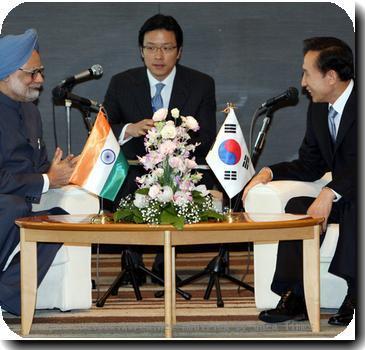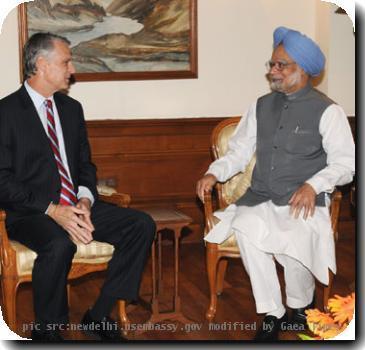India, Pakistan take steps to revive spiked peace process (Roundup)
By Sarwar Kashani, IANSThursday, April 29, 2010
THIMPHU - Prime Ministers Manmohan Singh of India and Yousuf Raza Gilani of Pakistan Thursday held their first talks in nine months here and agreed to think afresh on how to “honestly” take forward their peace process stalled after the 26/11 Mumbai terror attack.
During their 50-minute talks at Bhutan House here, the two leaders directed their foreign ministers and foreign secretaries to work out modalities to restore trust that could pave the way for “substantive dialogue” between the two countries.
It was the first substantive indication that the two countries may be looking at the possibility of reviving a peace process that feel victim to the Mumbai attack blamed on Pakistani terrorists that left 166 Indians and foreigners dead.
Manmohan Singh and Gilani met on the margins of the eight-nation South Asian Association for Regional Cooperation (SAARC) summit.
“They agreed that the foreign ministers and foreign secretaries will be charged with working out the modalities of restoring trust, paving the way for substantive dialogue covering all issues between them,” Indian Foreign Secretary Nirupama Rao told reporters.
“The two sides agreed to think afresh on the way forward and assess the reasons underlying the current status of relationship,” said Rao.
“They discussed all issues of mutual concern… renewal of dialogue, understand the state of relationship, what is it that is holding us back. It was a soul searching exercise. They decided to honestly take the process forward,” Rao said, adding the two sides have agreed to meet “as soon as possible”.
Pakistan Foreign Minister Shah Mehmood Qureshi admitted that trust deficit still existed between the two countries but added that their foreign ministers would help bring the relationship to normalcy.
Singalling a marked improvement in their relations that dipped to a new low after the 26/11 attack, both leaders stressed that the talks were held in a very warm and cordial atmosphere.
The outcome of the meeting has changed the bilateral climate, an upbeat Qureshi said. “It’s good news for the region. Let us be happy with that.”
Rao said Manmohan Singh and Gilani “held very good talks in a free and frank manner” and added that the Indian premier voiced New Delhi’s concern over the slow progress of the Mumbai attackers’ trial in Pakistan.
Manmohan Singh told Gilani that India was willing to discuss all issues of mutual concern but the issue of terrorism was holding back progress.
The focus is on charting the way forward, Rao said.
“It does the relationship no good to get stuck in the nomenclature. We don’t have to get stuck to nomenclature as both sides have agreed to restore trust and build the mutual confidence and that we should do,” she said.
Manmohan Singh and Gilani last met at the Egyptian resort town of Sharm el-Sheikh in July 2009. The meeting led to a contentious joint declaration delinking the composite dialogue process from Pakistan’s actions against terror and the first-ever reference to Balochistan in an India-Pakistan joint statement.
This time round, according to Rao, Balochistan was not a part of the official talks. Neither did Afghanistan, which has emerged as a new theatre of rivalry between the two countries, figure in the talks.
Manmohan Singh raised India’s concerns over cross-border terror and the sharp spike in infiltration, with Pakistan promising that its territory would not be used for terror directed against India, the Indian foreign secretary said.
“The prime minister was emphatic that the terror machine that operates from Pakistan needs to be dismantled,” she said.
Gilani conveyed that Pakistan was serious about prosecuting the perpetrators of the Mumbai attack and all efforts should be made to bring the trial of the Mumbai accused to a speedy conclusion, Rao said.
Rao said Manmohan Singh conveyed “deep concerns” about Laskkar-e-Taiba chief Haafiz Saeed, the suspected masterminds of the Mumbai attack.
Rao said the Pakistan prime minister, on his part, “did mention that they have difficulties in their legal system” to prosecute Saeed, who had openly declared a jehad against India in a rally Feb 5.
“Pakistan has said it won’t allow terrorists to use its soil,” she said.

